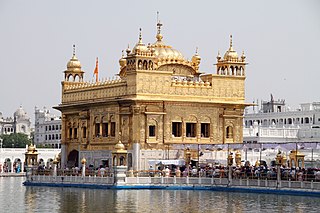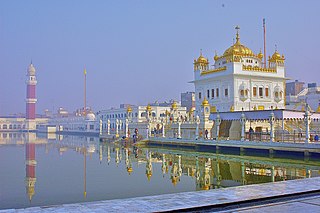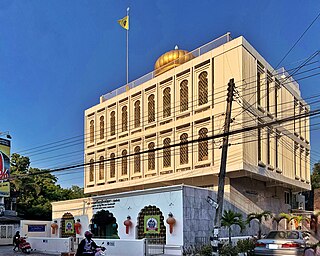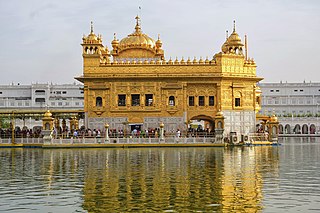
Sikhism, also known as Sikhi, is an Indian religion and philosophy in particular for the Sikh ethnoreligious group that originated in the Punjab region of India around the end of the 15th century CE. The Sikh scriptures are written in the Gurumukhi script particular to Sikhs. It is one of the most recently founded major religious groups and among the largest in the world, with about 25–30 million adherents.

A gurdwara or gurudwara is a place of assembly and worship for Sikhs but its normal meaning is place of guru or "Home of guru". Sikhs also refer to gurdwaras as Gurdwara Sahib. People from all faiths and religions are welcomed in gurdwaras. Each gurdwara has a Darbar Sahib where the Guru Granth Sahib is placed on a takht in a prominent central position. Any congregant may recite, sing, and explain the verses from the Guru Granth Sahib, in the presence of the rest of the congregation.

The Shiromani Gurdwara Parbandhak Committee is an organization in India responsible for the management of Gurdwaras, Sikh places of worship in states of Punjab and Himachal Pradesh and the union territory of Chandigarh. SGPC also administers Darbar Sahib in Amritsar.

Tarn Taran Sahib is a city in the Majha region of the state of Punjab, in northern India. It is the district headquarters and hosts the municipal council of Tarn Taran district. Gurdwara Sri Tarn Taran Sahib, a prominent Sikh shrine, is located in the central part of the city.

Anandpur Sahib, also referred simply as Anandpur, is a city in Rupnagar district (Ropar), on the edge of Shivalik Hills, in the Indian state of Punjab. Located near the Sutlej River, the city is one of the most sacred religious places in Sikhism, being the place where the last two Sikh Gurus, Guru Tegh Bahadur and Guru Gobind Singh, lived. It is also the place where Guru Gobind Singh founded the Khalsa Panth in 1699. The city is home to Takhat Sri Kesgarh Sahib, the third of the five Takhts in Sikhism.

The Takht Sri Darbar Sahib Damdama Sahib, is one of the five takhts or Seat of Temporal Authority of Sikhism, located in Talwandi Sabo, near the city of Bathinda in Bathinda district of Punjab, India. At this place Guru Gobind Singh, the tenth Sikh Guru, prepared the full version of the Sikh scriptures called Sri Guru Granth Sahib in 1705. The other four Takhts are the Akal Takht, Takht Sri Keshgarh Sahib, Takht Sri Patna Sahib and Takht Sri Hazur Sahib.
Ravidassia or the Ravidas Panth is a religion based on the teachings of Guru Ravidas. It was considered a sect within Sikhism until 2009. However, some Ravidassias continue to maintain Sikh religious practices, including the reverence of the Guru Granth Sahib as their focal religious text, wearing Sikh articles of faith (5Ks), and appending Singh or Kaur to their names.

Sardar Hukam Singh was an Indian politician and the third Speaker of the Lok Sabha and second Deputy Speaker of the Lok Sabha from 1962 to 1967. He was also governor of Rajasthan from 1967 to 1972.

Sikhism is a recognised minority religion in Thailand, with about 100,000 adherents. The religion was brought by migrants from India who began to arrive in the late 19th century. There are about twenty or Gurdwaras in the country, including the Gurdwara Sri Guru Singh Sabha in Bangkok.

German Sikhs are a growing religious minority in Germany. The majority of German Sikhs have their roots from the Punjab, India with the remaining coming from the Afghan Sikh community or through conversion. The number of Sikhs is estimated to be between 25,000. Germany had the fifth highest Sikh population in Europe after United Kingdom (524,000), Italy (220,000), Portugal (35,000) and Spain (26,000).

Italian Sikhs are a growing religious minority in Italy, which has the second biggest Sikh population in Europe after the United Kingdom (525,000) and sixth largest number of Sikhs in the world. It is estimated that there are 220,000 Sikhs in Italy, constituting 0.3% of the total Italian population.

Sikhs are a religious minority in the Netherlands. They number around 15,000 and most of them live in or around Amsterdam. There are nine gurudwaras in the Netherlands.

English Sikhs number over 520,000 people and account for 0.9% of England's population in 2021, forming the country's fourth-largest religious group. In 2006 there were 352 gurdwaras in England. The largest Sikh populations in the U.K. are in the West Midlands and Greater London.

Choor Singh Sidhu, known professionally as Choor Singh, was a Singaporean lawyer who served as a judge of the Supreme Court of Singapore and, particularly after his retirement from the bench, a philanthropist and writer of books about Sikhism. Born to a family of modest means in Punjab, India, he came to Singapore at four years of age. He completed his secondary education in the top class at Raffles Institution in 1929, then worked as a clerk in a law firm before becoming a civil servant in the Official Assignee's office.

The Golden Temple (also known as the Harmandir Sahib, or the Darbār Sahib, is a gurdwara located in the city of Amritsar, Punjab, India. It is the pre-eminent spiritual site of Sikhism. It is one of the holiest sites in Sikhism, alongside the Gurdwara Darbar Sahib Kartarpur in Kartarpur, and Gurdwara Janam Asthan in Nankana Sahib.

The Singh Sabha Movement, also known as the Singh Sabha Lehar, was a Sikh movement that began in Punjab in the 1870s in reaction to the proselytising activities of Christians, Hindu reform movements and Muslims. The movement was founded in an era when the Sikh Empire had been dissolved and annexed by the British, the Khalsa had lost its prestige, and mainstream Sikhs were rapidly converting to other religions. The movement's aims were to "propagate the true Sikh religion and restore Sikhism to its pristine glory; to write and distribute historical and religious books of Sikhs; and to propagate Gurmukhi Punjabi through magazines and media." The movement sought to reform Sikhism and bring back into the Sikh fold the apostates who had converted to other religions; as well as to interest the influential British officials in furthering the Sikh community. At the time of its founding, the Singh Sabha policy was to avoid criticism of other religions and political matters.

Hazur Sahib, also known as Takht Sachkhand Sri Hazur Abchalnagar Sahib, is one of the five takhts in Sikhism. The gurdwara was built between 1832 and 1837 by Maharaja Ranjit Singh (1780–1839). It is located on the banks of the Godavari River at the city of Nanded in the state of Maharashtra, India.

Sikhism in Greece dates back to the early 1900s, where many Sikhs came to the country through British Indian Army in the World War I and World War II. As of 2012, there are approximately 20,000 Sikhs in Greece. The Sikh population in Greece has grown over the years, with many Sikhs migrating to the country for agricultural work or to start their own businesses.
Sikhism in Denmark is a minority religion. There are estimated to be 5,000 Sikhs living in Denmark.



















